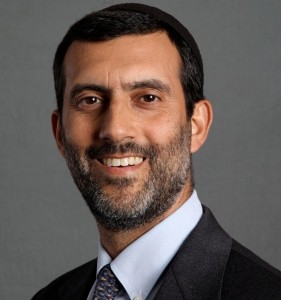 Rabbi David Jaffe is the Mashgiach Ruchani/Spiritual Advisor at Gann Academy in Waltham and the Dean of the Kirva Institute. He teaches in the JOIN for Justice Organizing Fellowship and is working on a book about the inner life and social activism.
Rabbi David Jaffe is the Mashgiach Ruchani/Spiritual Advisor at Gann Academy in Waltham and the Dean of the Kirva Institute. He teaches in the JOIN for Justice Organizing Fellowship and is working on a book about the inner life and social activism.
It all started with a question.
“How is your employer treating you?” I asked the foreman of the evening cleaning crew at my Jewish high school one night.
I was motivated to ask because the year before the school held its Junior/Senior prom at the Hyatt, which many people in the Jewish and general communities are boycotting due to mistreatment of housecleaners. I personally signed on to this boycott but did not pay attention to where we scheduled our prom and the prom organizers were not aware of the labor issues. With the help of the Jewish Labor Committee and Rabbi Barbara Penzner we invited former Hyatt housecleaners and Hyatt management to address our school community. The welfare of the folks who clean up after us was on my mind.
“No good. No benefits, vacation or sick leave,” the foreman responded. I didn’t like that answer. After a little research I found that our contractor was actually on the Service Employee’s International Union (SEIU) Local 615 Responsible Contractor list and as such, was required to provide some of the benefits our foreman said were missing. A call to the union and an investigation later, the contractor was under pressure. At the same time my school wanted to cut costs and was looking for a lower bid for the cleaning contract. No other union contractor sent in bids, so we interviewed two of the non-union companies.
Again, the power of questions. One of these companies was actually not an employer itself but a broker of contractors. We asked, “How much do you pay your workers?” The representative seemed shocked that we cared. “Uh, we don’t know for sure.”
The next non-union contractor was a small, start-up headed by a former cleaner. “How much do you pay your crew?” we asked. “$10 per hour.” I was very proud of my colleague who ended this conversation by claiming, “It is unacceptable to pay our crew $10 when the prevailing union wage is $12.50.”
Now we were back to our original union contractor. In the meantime we found out that this contractor was also in violation of the Master Contract because none of the crew were union members. We had a heart to heart with the owners. “Why aren’t the crew members in the union?” we asked. “They don’t want to be in the union. They are part-time employees and this is extra cash for them. They don’t want the union dues taken out” was the response. He must have been quite surprised when the entire crew immediately signed and returned their union cards the next month when they were sent directly to their homes and not administered through the employer.
Once the crew joined the union we signed a new agreement with our contractor. This time we enshrined our questions in the language of the contract.
Furthermore, the Contractor acknowledges that the school has entered into this agreement based on the Contractor’s agreement to hold true to the school’s core values which include:
- Ensuring the dignity of the worker
- Fair treatment of employees – Contractor pays fair wages, benefits as appropriate, provides promotion opportunities and has written procedures for performance feedback. It also includes mechanisms for employees to share grievances.
- Focus on safety – includes regular training regarding safe lifting and hazardous materials.
From now on we will ask every contractor, “Do you share our values?”
There is an ancient Jewish story about the power of questions:
“…a man was traveling from place to place when he saw a building in flames. ‘Is it possible that the building lacks a person to look after it?’ he wondered. The owner of the building looked out and said, ‘I am the owner of the building.’ Similarly, because the patriarch Abraham looked at the idolatry and oppression in the world and said, ‘Is it conceivable that the world is without a guide?’ the Holy One looked out and said to him, ‘I am the Guide, the Sovereign of the Universe.” (Genesis Rabbah 39:1)
I understand this story to be teaching us the power of questions. Abraham grew up in a world that didn’t question religious and economic oppression. Most people accepted that the way things were is the way they are always going to be. Abraham was different. He asked why. Why does everyone worship idols? Why is there so much violence and oppression? Can it be that the creator of the universe doesn’t care? His questions and concern for the world in some way forced God’s presence to appear.
Oppression thrives undisturbed. Asking a simple question like “How does your employer treat you?” reveals what was hidden and makes living with the status quo impossible. Questions can create discomfort and can bring relief to those living with invisible pain. With persistence questions might just reveal the face of God in the form of Justice.






